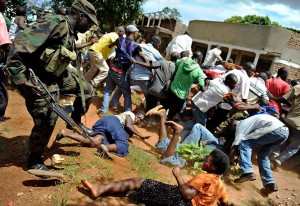Uganda walks to work with social media
As Yoweri Museveni begins his new term as President of Uganda, the simple act of walking to work has taken on a whole new meaning.
Last month, a loose coalition of opposition political parties and civil society groups known as Activists for Change called on people to walk to work as a way of showing concerns of rising fuel and food prices.
However, the government’s heavy crack down on the Walk to Work marches has made headlines around the world – particularly with photos and footage showing opposition leader Kizza Besigye being pepper sprayed and brutally dragged away by police.
According to Human Rights Watch nine people have been killed during clashes with police.
![]() read more
read more
Live blogs reveal a huge appetite for information

Photo credit: Flickr/@afloden
![]() read more
read more
#ugandavotes – the impact of social media in reporting elections
.jpg)
Facebook and Twitter are well established tools of the trade for many journalists but less so in countries such as Uganda. However, the recent elections may well have changed that. In a guest blog post, Ruth Aine a journalist from the Radio station Power FM in Kampala, describes the rise of social media during Uganda's recent elections.
![]() read more
read more
The pros and cons of user-generated content
Radio and TV audiences today don’t just want to be spoken to by broadcasters; they want to join the discussion. They want to share their views and stories, and modern communication tools like mobile phones, digital cameras and the internet give them that opportunity.
Broadcasters who do not grasp this fundamental change in communication behavior may soon find themselves bypassed by social media sites like Facebook and Twitter.
In order to stay relevant, radio and TV stations have to find new ways of integrating the audience into their programming. On the simplest level, this can be done by taking letters and e-mails from the audience seriously. A next level can be call-in programs, which center on listeners’ concerns, questions, comments and experiences.
![]() read more
read more










Feedback